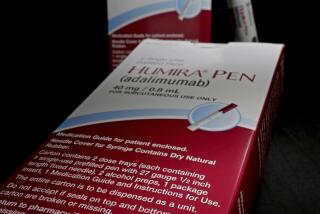Drug Firms Await Ruling on Generic Form of Prilosec
- Share via
NEW YORK — The drawn-out court battle over heartburn drug Prilosec is giving industry watchers indigestion.
The judge’s ruling in this case--after a trial in a New York courtroom that stretched from early December 2001 through mid-July of this year--should determine whether generic drug makers are allowed to sell cut-rate copycat versions of the blockbuster medicine, which pulls in $6 billion per year for Anglo-Swedish drug maker AstraZeneca.
As Congress and consumer groups mull how to address the soaring costs of prescription drugs, insurance companies, uninsured Americans and retirees stand to benefit from the introduction of cheap generic forms of a widely used medicine with a hefty price tag of more than $120 per month.
Since the trial ended this summer, speculation about the timing of U.S. District Judge Barbara Jones’ decision has been rampant.
Jones has been at the center of some high-profile cases, such as a trial this year aiming to force MasterCard and Visa to open up the U.S. credit-card business.
She is now presiding over the closely watched fraud case against former WorldCom Inc. executives in New York.
Drug industry analysts and observers expressed wildly divergent views about the news Jones would be taking on the WorldCom case. Some believed it signified a swift ending to the Prilosec matter, while others speculated that she would be distracted by the WorldCom case and would be unable to quickly finish writing a ruling on Prilosec.
“Judge Jones has other criminal matters but we would expect the public interest in the WorldCom case might create upfront demands that may slow final preparation of the Prilosec decision,” Sanford Bernstein analyst Catherine Arnold said in a recent research note.
“An alternative view circulating in the market is that the judge accepted assignment of this case because she is done or almost done with her legal opinion of the Prilosec trial,” Arnold wrote. “Her acceptance” of the WorldCom matter “may have nothing to do with the status of the Prilosec case.”
Each day that copycats are delayed, AstraZeneca saves more than $5 million in sales that could have been lost to generic rivals. The company’s main patent protection ended last Oct. 5. Prilosec was the world’s top-selling drug in 2000.
Jones’ history does not suggest a rapid resolution, according to some analysts. She has a reputation for writing thorough decisions unlikely to be overturned on appeal.
Some analysts attended every day of the 7 1/2-month trial or sent legal advisors to help decipher the proceedings. Several say they check with the court in southern Manhattan daily to see if a decision is forthcoming, even though the judge’s chambers rebuffs all questions.
AstraZeneca has a lot to lose. If its patents on the method of making Prilosec are invalidated, it would lose its U.S. monopoly over the drug and would likely face challenges over the validity of its patent protection on second-generation heartburn drug Nexium. AstraZeneca is heavily marketing Nexium to persuade doctors to switch patients to the newer drug in anticipation of losing exclusivity for Prilosec.
An AstraZeneca executive said last week the company was prepared for an announcement “any day,” adding it was unclear what significance--if any--Jones’ deployment on the WorldCom case would have on the timing.
AstraZeneca has prepared a series of different draft press releases to react to various potential patent rulings, and the company expects to get only 15 minutes’ warning of the judgment before it is made public.
Drug giant Merck & Co. receives the proceeds of more than 30% of U.S. Prilosec sales, which translates into more than $1 billion a year, from a deal with AstraZeneca. So Merck also benefits each day generics are delayed.
In contrast, small generic drug companies have a lot to gain. Andrx Corp., the company leading the charge to take Prilosec generic, could generate $500 million during a six-month generic exclusivity period. That compares with its current annual revenue of less than $1 billion.
Andrx’s stock has been on a wild ride since the trial began in early December, topping $70 at the start of the year but sinking to just above $20 as the trial dragged on. In Nasdaq trading Friday, Andrx stock fell 41 cents to $24.65.
More to Read
Inside the business of entertainment
The Wide Shot brings you news, analysis and insights on everything from streaming wars to production — and what it all means for the future.
You may occasionally receive promotional content from the Los Angeles Times.









